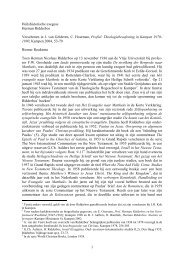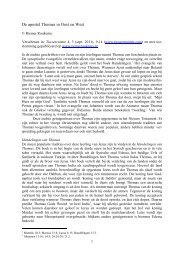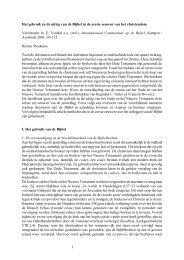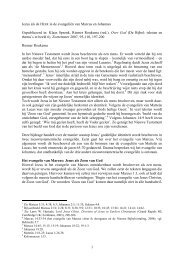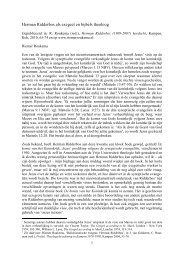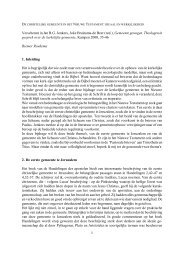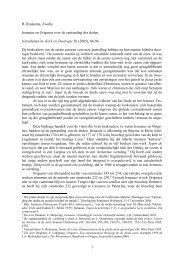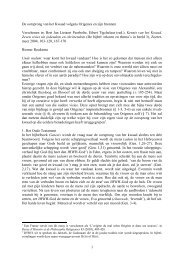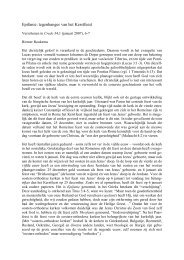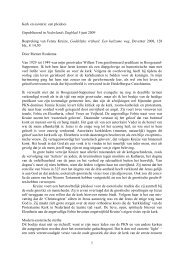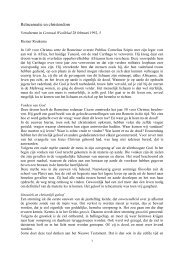Herman Ridderbos‟s Redemptive -historical ... - Riemer Roukema
Herman Ridderbos‟s Redemptive -historical ... - Riemer Roukema
Herman Ridderbos‟s Redemptive -historical ... - Riemer Roukema
You also want an ePaper? Increase the reach of your titles
YUMPU automatically turns print PDFs into web optimized ePapers that Google loves.
the redemptive facts, but also many other details should be accepted as <strong>historical</strong><br />
facts.<br />
Works on the apostle Paul (1952-1966)<br />
In Ridderbos‟s interpretation of the Pauline Epistles we see a different aspect of the<br />
term “redemptive-<strong>historical</strong>” becoming apparent. In his work Paul and Jesus (1952<br />
in Dutch) he remarks: “Under the influence of the basic theme of the Reformation,<br />
justification by faith was for a long time viewed as the actual content of Paul‟s<br />
gospel, around which all the other elements of his epistles were grouped” (63).<br />
Ridderbos recognizes that justification by faith is part of the core of Paul‟s preaching<br />
and is not a secondary “polemic” directed against the Jews (as taught by Wrede),<br />
or a “side-issue within the main stream of the mystical doctrine of redemption of<br />
„being in Christ‟” (as taught by Schweitzer). Yet Ridderbos observes that “by<br />
approaching Paul‟s doctrine exclusively from the standpoint of justification by faith<br />
there is a danger of depriving Paul‟s preaching of its redemptive <strong>historical</strong> dynamic<br />
and of making it into a timeless treatment of the vital question: how is one justified<br />
before God?” (63). After all, whoever attempts to understand Paul from the perspective<br />
of this personal question, loses sight of the fact that Paul knew himself to be the<br />
herald of the “fullness of time” and of the new things that had arrived in the framework<br />
of time through Christ (63-4).<br />
This emphasis on redemptive history is a regular feature in his commentaries<br />
on the Pauline epistles. Ridderbos points out that Paul wrote about the history of<br />
God‟s involvement with Israel and humankind, starting with Adam, Abraham,<br />
Moses and the prophets and culminating in the salvation that appeared in Christ. 46<br />
This implies that when Paul writes about baptism, he does not in the first place talk<br />
about a mystical or ethical renewal of man, but about a renewal in the redemptive<strong>historical</strong><br />
and eschatological sense. This means that the person who is being baptized<br />
is being incorporated into something that has taken place in Christ once and for<br />
all. Ridderbos uses the term “corporate” (Aan de Romeinen, 114, 125) to describe<br />
this; he means by this that the believer is part of a collective that was first ruled by<br />
sin and later saved by Christ. In doing this he attempts to shift the focus away from a<br />
mystical interpretation of Paul that is concerned with the spiritual development of<br />
the individual. According to Ridderbos, the apostle was not concerned with the<br />
spiritual or mystical experience of the individual in baptism, or with a scheme for<br />
spiritual progress and the determination of growth in moral conduct. In his view,<br />
Paul places the emphasis on that which the believer has received in Christ, without<br />
explicitly being concerned with the believer‟s personal experiences. Or, in Ridderbos‟s<br />
own words: “The corporate, redemptive-<strong>historical</strong> viewpoint explains both the<br />
forensic and the ethical salvation from sin” (Aan de Romeinen, 125). His emphasis<br />
on the redemptive-<strong>historical</strong> interpretation of Paul is so strong that in discussing the<br />
“strong” and the “weak” in Romans 14, he remarks that there Paul does not write<br />
from a redemptive-<strong>historical</strong> viewpoint but from a pastoral one (Aan de Romeinen,<br />
302). 47<br />
46 For instance, The Churches of Galatia, 129, 135, 137, 147-8; Aan de Romeinen, 20, 81, 98, 112,<br />
124, 125, 128, 129, 134, 135, 203, 251, 261; Aan de Kolossenzen, 181, 203, 205-6.<br />
47 In Paul, 321, he makes a similar remark about Paul‟s admonition regarding the authorities in<br />
Romans 13.<br />
10



